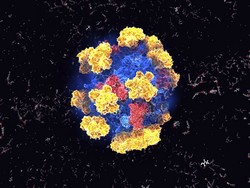Green catalysts for industry
Enantiomers are chiral compounds sharing the same chemical name and having the same types of atoms but with different 3D structures. As structural differences affect function, enantiomers of the same compound can have different activities as drugs or catalysts of chemical reactions. Biocatalysts (enzymes) offer an important alternative to chemical catalysts for reducing the use of organic solvents, toxic metals and energy. Scientists initiated the EU-funded project KYROBIO (The discovery, development and demonstration of biocatalysts for use in the industrial synthesis of chiral chemicals) to increase the currently limited availability of enzymes for production of single enantiomer chiral chemicals on an industrial scale. Single-enantiomer chiral compounds are an industrially important class of chemicals often used in catalysis. KYROBIO developed a toolbox of techniques, including those related to bioinformatics, molecular modelling, high-throughput enzyme generation and plant transcriptome analyses. Some noteworthy achievements include their metagenomics programme for enzyme discovery, the CorNet module for the 3DM analysis system and enzyme modification protocols developed using computational library design. These technologies greatly reduce experimental screening of mutants and materials used, simultaneously enabling more effective achievement of targeted properties. To facilitate industrial scale enzyme production platforms, researchers delivered an enzyme immobilisation methodology that can be tailored to the process application. The aim was to improve stability and permit the reuse of biocatalysts. Some important developments include the novel hydroxynitrile lyases obtained from a reverse genetics approach on the fern transcriptome that were successfully immobilised. This could prove useful for crop protection and the production of insect repellents. Lyases are important in the manufacture of high-value pharmaceutical and specialty chemical products. Synthesis of commercially-relevant molecules such as chiral amines, terpenoids and chiral cyanohydrins is now possible. The project widely disseminated their findings to a broad audience of industry leaders, academics, policymakers and the public. Besides training courses and web-based informatics tools, the team has also produced over 25 publications and several online communications. KYROBIO activities could eventually put the EU at the forefront of efficient, sustainable and eco-friendly chemical production. Already, a patent has been filed and plans for commercialisation are in place. Beneficiaries include the agrochemicals, fine chemicals and pharmaceutical sectors.
Keywords
Biocatalyst, enzyme, chemicals' production, enantiomer, KYROBIO, bioinformatics, modelling, transcriptome,

